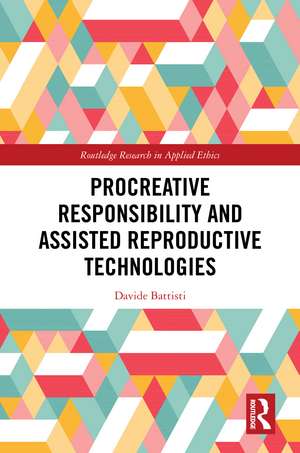Procreative Responsibility and Assisted Reproductive Technologies: Routledge Research in Applied Ethics
Autor Davide Battistien Limba Engleză Hardback – 24 iul 2024
Traditionally, Assisted Reproductive Technologies are understood as practices aimed at extending the procreative freedom of prospective parents. However, some scholars argue that they also give rise to new moral constraints. This book builds on this viewpoint by presenting a person-affecting perspective on the impact of current and future Assisted Reproductive Technologies on procreative responsibility, with a specific focus on reproductive Genome Editing and ectogenesis. The author shows that this perspective is defensible both from a consequences-based person-affecting perspective and from a person-affecting account that considers morally relevant intuitions and attitudes.
Procreative Responsibility and Assisted Reproductive Technologies will appeal to scholars and advanced students working in bioethics and procreative ethics.
Din seria Routledge Research in Applied Ethics
- 9%
 Preț: 934.96 lei
Preț: 934.96 lei -
 Preț: 313.01 lei
Preț: 313.01 lei - 9%
 Preț: 935.57 lei
Preț: 935.57 lei -
 Preț: 327.22 lei
Preț: 327.22 lei -
 Preț: 294.29 lei
Preț: 294.29 lei -
 Preț: 309.79 lei
Preț: 309.79 lei -
 Preț: 389.38 lei
Preț: 389.38 lei - 18%
 Preț: 890.74 lei
Preț: 890.74 lei - 18%
 Preț: 1003.61 lei
Preț: 1003.61 lei -
 Preț: 387.42 lei
Preț: 387.42 lei -
 Preț: 392.37 lei
Preț: 392.37 lei -
 Preț: 311.61 lei
Preț: 311.61 lei -
 Preț: 385.08 lei
Preț: 385.08 lei - 18%
 Preț: 999.97 lei
Preț: 999.97 lei - 17%
 Preț: 258.50 lei
Preț: 258.50 lei - 21%
 Preț: 257.68 lei
Preț: 257.68 lei - 18%
 Preț: 1000.27 lei
Preț: 1000.27 lei -
 Preț: 389.70 lei
Preț: 389.70 lei -
 Preț: 387.75 lei
Preț: 387.75 lei -
 Preț: 385.25 lei
Preț: 385.25 lei -
 Preț: 397.16 lei
Preț: 397.16 lei - 26%
 Preț: 764.34 lei
Preț: 764.34 lei -
 Preț: 383.68 lei
Preț: 383.68 lei -
 Preț: 385.84 lei
Preț: 385.84 lei - 21%
 Preț: 257.23 lei
Preț: 257.23 lei - 18%
 Preț: 993.49 lei
Preț: 993.49 lei -
 Preț: 388.90 lei
Preț: 388.90 lei - 18%
 Preț: 1005.67 lei
Preț: 1005.67 lei -
 Preț: 389.38 lei
Preț: 389.38 lei - 31%
 Preț: 762.58 lei
Preț: 762.58 lei -
 Preț: 407.01 lei
Preț: 407.01 lei
Preț: 1001.70 lei
Preț vechi: 1221.58 lei
-18% Nou
Puncte Express: 1503
Preț estimativ în valută:
191.74€ • 208.34$ • 161.16£
191.74€ • 208.34$ • 161.16£
Carte tipărită la comandă
Livrare economică 21 aprilie-05 mai
Preluare comenzi: 021 569.72.76
Specificații
ISBN-13: 9781032652085
ISBN-10: 103265208X
Pagini: 242
Dimensiuni: 152 x 229 mm
Greutate: 0.49 kg
Ediția:1
Editura: Taylor & Francis
Colecția Routledge
Seria Routledge Research in Applied Ethics
Locul publicării:Oxford, United Kingdom
ISBN-10: 103265208X
Pagini: 242
Dimensiuni: 152 x 229 mm
Greutate: 0.49 kg
Ediția:1
Editura: Taylor & Francis
Colecția Routledge
Seria Routledge Research in Applied Ethics
Locul publicării:Oxford, United Kingdom
Public țintă
Postgraduate and Undergraduate AdvancedCuprins
Introduction 1. Current and Future Assisted Reproductive Technologies and Prenatal Treatments 2. Responsibility, Procreation, and Reproduction 3. Procreative Beneficence, the Non-Identity Problem, and Impersonal Harm 4. Person-Affecting Morality and the Future of Human Reproduction 5. Is Genome Editing Really Non-Identity-Affecting? A Defense of the Greater Moral Obligation View 6. Responsibility, Genetic Enhancement, and the Child’s Right to an Open Future 7. Beyond Consequences? Attitudes and Intentions in Current and Future Assisted Reproduction Conclusions
Recenzii
"Procreative Responsibility and Assisted Reproductive Technologies examines the whole gamut of new technologies related to reproduction, including in vitro gametogenesis, artificial wombs, and genome editing. Surprisingly, and I think correctly, Battisti argues that some of these, such as genome editing and artificial wombs, will create new and more demanding obligations and responsibilities for parents. This is a tour de force in reproductive ethics: comprehensive, deep, carefully argued, balanced, and challenging. It is a must-read for those entering these debates and for old soldiers who will discover new perspectives."
Julian Savulescu, Chen Su Lan Centennial Professor in Medical Ethics and Director of the Centre for Biomedical Ethics at National University of Singapore
Julian Savulescu, Chen Su Lan Centennial Professor in Medical Ethics and Director of the Centre for Biomedical Ethics at National University of Singapore
Notă biografică
Davide Battisti is a postdoctoral researcher in Philosophy of Law and Bioethics at the Department of Law of the University of Bergamo. He also serves as an adjunct professor of Bioethics in the Politics, Philosophy, and Public Affairs Program at the University of Milan and the Vita-Salute San Raffaele University. He has published several papers on topics such as reproductive ethics, the allocation of scarce healthcare resources, the ethics of science communication, and research ethics. His work has appeared in journals such as Bioethics, the Journal of Medical Ethics, Social Epistemology, and Ethics of Human Research.
Descriere
This book rethinks procreative responsibility considering the continuous development of assisted reproductive technologies. It presents a person-affecting moral argument, highlighting that the potential availability of future assisted reproductive technologies brings out new procreative obligations.
